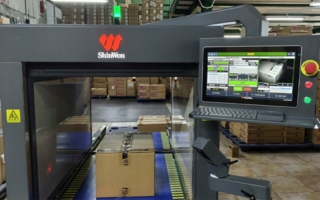19/06/2018 – Hermes — auf Deutsch lesen
Trends in Supply Chain Management
The current Hermes barometer reveals: Only eight percent of companies surveyed have a digitised supply chain.
The logistics sector is considered to be a trailblazer for digitisation in Germany. However, the current Hermes barometer reveals: Only eight percent of companies surveyed have a digitised supply chain. Within the framework of the study, Hermes Germany posed questions to 200 logistics decision-makers in German companies on the topic of “Trends in Supply Chain Management”.
According to the Hermes barometer, the digitisation of the supply chain is far less advanced than is assumed: Only eight percent of the companies surveyed have already successfully set up a transformation programme. A further 19 percent have started on implementing such a programme. However, 42 percent of the companies surveyed are right at the beginning. They indicated that they have just become aware of the necessity for digitisation. They are still far away from having a digital strategy, which almost one- third of the companies have already developed.
Know-how is sought-after
46 percent of those surveyed want to avail of the services of logistics service providers for the management of their supply chain in the future. Almost half (47 percent) of all logistics decision-makers surveyed additionally indicated that, when choosing logistics service providers, they pay more attention to the expertise of these service providers in regard to the digitisation of supply chains. “That shows how strong the demand is for our know-how. At the same time, the number of companies that are still uncertain when it comes to the digital transformation of their supply chain is somewhat surprising”, comments Jan Bierewirtz, Head of Business Development Supply Chain Solutions at Hermes Germany.
Self-learning systems on trend
Studies show that many companies are unclear when it comes to the economic benefits of cloud and IoT technologies. Logistics decision-makers also attribute a lesser significance to these technologies. Only one-third of those surveyed consider cloud applications and IoT-enabled machines to be important.
On the other hand, self-learning systems are of prime importance for those surveyed (46 percent) in order, for example, to automatically trigger ordering processes. These were followed by mobile applications, e.g. for intra-company logistics (43 percent) as well as by blockchain technology for optimising data handling and for process optimisation (40 percent). “What needs to be done here is to show companies the potential that cloud and IoT technology offers for their supply chain”, says Jan Bierewirtz. “In order to be successful in the long term, there is no way around this technology”, predicts Jan Bierewirtz.
Cost reduction and lean management of utmost importance
A central trend in supply chain management continues to be the desire for cost reductions as well as lean management approaches. 81 percent of the logistics decision- makers consider these aspects to be the most important. These are followed by optimisation of stock levels through effective inventory management (78 percent) as well as intensification of collaboration with partner companies, which is of major importance for 71 percent of logistics decision-makers. “The reduction of complexity and costs are, of course, key targets of successful supply chain management. Costs savings and a reduced demand for liquid assets create space for additional investments and further optimisation”, explains Jan Bierewirtz.
Logistics experts such as Hermes Germany support companies in identifying and exploiting potential for optimisation along the supply chain. Existing structures are examined with the aid of the SCAN analysis tool and, finally, recommended actions and specific measures to increase efficiency within the supply chain are given.
The complete Hermes barometer and further information on the topic of Logistics 4.0 and Supply Chain Management are to be found HERE
About the survey
Participants: 200 logistics decision-makers
Method: Telephone survey by GESS Phone & Field Marktforschung GmbH
Survey period: January 2018


